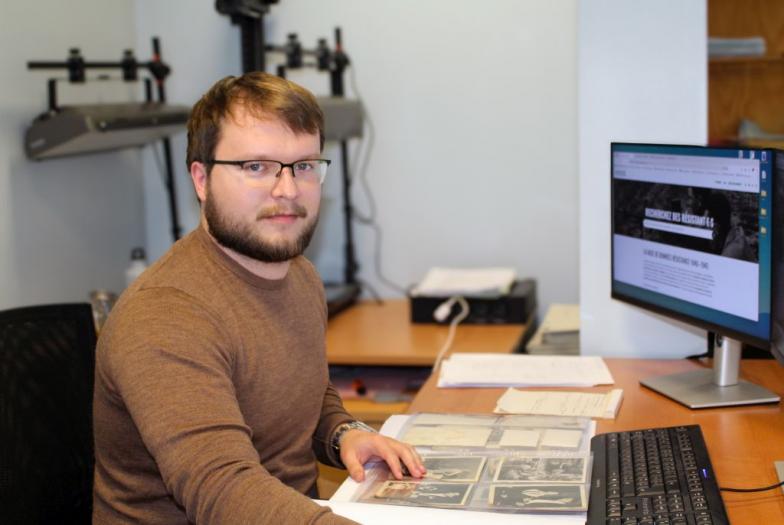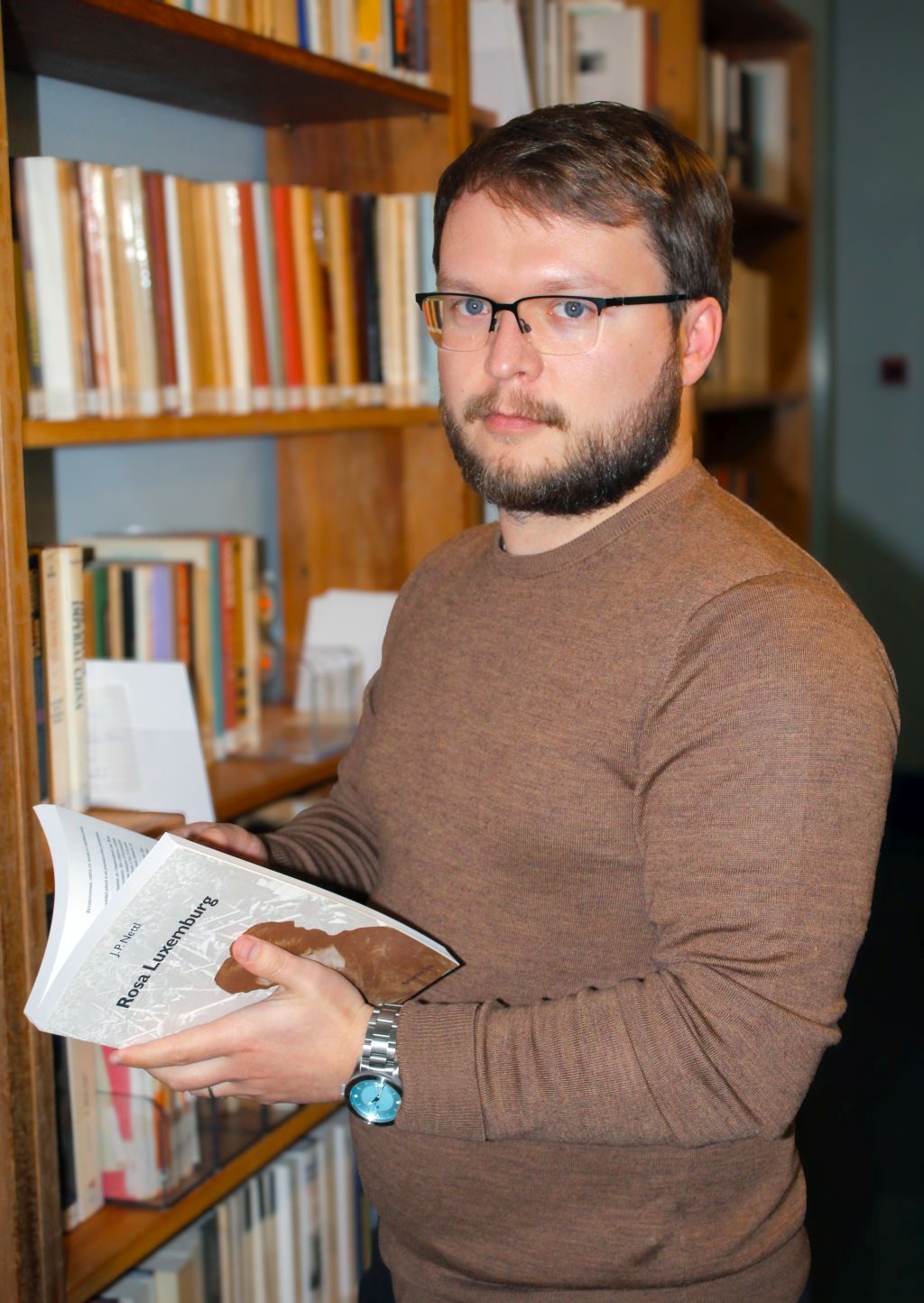THREE QUESTIONS TO ... Artyom Lyapounov,
craftsman in the digitization and conservation of collections

For many years, CegeSoma has been conducting research into the Second World War and contemporary conflicts. While this work is often highlighted in the media, it also relies on equally essential behind-the-scenes work: the conservation and digitization of archives. Without this painstaking work, no research would be possible. Today, we put 3-4 questions to Artyom Lyapounov, the team member in charge of this fundamental mission. He holds a B.A. in Economics and an M.Sc. in Environmental Sciences and Management from Brussels University (ULB), and completed a number of internships in finance before arriving at CegeSoma in July 2023.
What does your job involve?
One of my main tasks is quality control of scanned documents. In other words, I check that each scan complies with a series of technical and visual criteria, by comparing it with the original document. Once this initial check has been completed, we move on to the post-production phase: the files are then converted into different formats, renamed, etc., to ensure their long-term preservation. This ensures their long-term preservation. For photographs, we also sometimes have to transform negatives into positives, crop images, adjust certain parameters, etc.
A few months ago, for example, I completed the processing of a photo collection from the personal archives of a German military photographer active during WWII. These include several hundred negative films, mainly taken in France during the Occupation, but also in Belgium, the Netherlands and Germany. The project took almost a year and a half to complete, as each photo had to be individually cut from the film strips and then digitally processed. Today, all these images can be consulted in all the State Archives reading rooms.
In addition, I also deal with requests for reproductions, which we receive by e-mail or directly from the reading room. These are mainly files on members of the Resistance that we keep. These documents are requested by family members or researchers. It's an aspect of the job that I really enjoy. We are often in contact with people who have been looking for information on their parents or grandparents for a very long time, and who finally discover something thanks to these files. It's a pleasure to get feedback from these people, who are sometimes on the other side of the world, in New Zealand or Canada for example.
Talking about the Resistance, I must mention the project that has taken up most of my time in recent months: the Resistance in Belgium project, the national database dedicated to the Resistance in Belgium. Following the departure of Anne Chardonnens, who was in charge of the project until recently, I took over the task of importing data onto the platform.
At the moment, I'm working on importing data from individual files linked to resistance fighter status in the underground press. This represents around 25,000 files. In addition, there are over 500 underground newspapers, each of which will have its own entry on the platform. Some of these publications can also be consulted online via our dedicated website: The Belgian War Press. It's a job that's very close to my heart, and one that I hope to complete.
In addition to these activities, the relatively small size of CegeSoma's staff also means that we have to take on a variety of day-to-day tasks. These range from providing support in the reading room, to preparing documents for university events, to moving collections or books into our storage areas, such as the basement.
What skills and challenges does your job require?
 I'd say that the work I do at CegeSoma relies above all on a strong capacity for self-organization, but also on patience and great attention to detail. Most of the tasks I carry out don't have a clearly defined deadline, but represent a considerable volume. This requires regular, steady effort if you ever want to get anywhere. So it's essential to stay focused, keep on track and avoid being overwhelmed or distracted by other urgent matters.
I'd say that the work I do at CegeSoma relies above all on a strong capacity for self-organization, but also on patience and great attention to detail. Most of the tasks I carry out don't have a clearly defined deadline, but represent a considerable volume. This requires regular, steady effort if you ever want to get anywhere. So it's essential to stay focused, keep on track and avoid being overwhelmed or distracted by other urgent matters.
I think I'm a naturally patient and meticulous person, qualities that serve me well on a daily basis. I'm glad that these personal qualities have proved relevant to the work I do at CegeSoma. Given the diversity of our assignments, it's also essential to be versatile and flexible, and sometimes creative too. We're regularly faced with unforeseen situations, where we have to come up with practical solutions using whatever means are at hand.
It also requires the ability to adapt to people and their needs. For example, when it comes to requests for reproductions, we often come into contact with elderly people, who may not be at ease with digital tools. We need to take the time to explain things, so that everyone can access the information without feeling lost.
The last major challenge I faced was the tasks I took on as part of the Resistance in Belgium project. In a very short period of time, I had to acquire a whole range of new skills and assimilate a vast amount of information. My thanks again to Anne Chardonnens, who did her utmost to share her expertise with me in such a short space of time.
What did you learn at CegeSoma that could help you in your future career?
In the field of history, I discovered the richness and complexity of the Resistance in Belgium, a topic I knew very little about before joining the project. Working closely with the archives has given me a better understanding of the issues at stake, the individual paths taken and the diversity of forms of commitment.
I've also acquired a large number of technical skills, particularly in digitization, postproduction and database management. These are skills that I probably wouldn't have been able to develop as intensively elsewhere, and which will be invaluable for the rest of my career.
It's a rather atypical job, combining several fields and involving a great deal of responsibility. It's this mix that I appreciate and that motivates me on a daily basis. Motivation also comes from my colleagues, people who are passionate about their work and committed to it, and with whom it's a pleasure to work.
Did you make interesting discoveries?
Of all the documents that passed through my hands, it is without doubt those in our diary collection that impressed me the most. When you spend hours handling these notebooks, you cannot help but read excerpts. And some remain in your memory.
I'm thinking in particular of the diary of a woman who, during the Occupation, recorded day after day her efforts to find her missing husband and brother. She documented everything, down to the smallest detail. On one page, she even had a sort of astrological calculation, as I understand it, to determine the “ideal” time to send a letter to someone who might be able to help her. In the final pages, she explains that she managed to locate them and is preparing to go and meet them.
I also looked through the diaries of resistance fighters imprisoned in Saint-Gilles or deported to Germany. They describe their daily lives, their fears, but also the solidarity between prisoners. These texts are often very moving. They offer a glimpse of history as it was experienced from the inside, in its most human dimension. Some of the stories have the feel of novels or film scripts, and yet they are true to life.
One of the notebooks recounts the life of a student in Liège during the Occupation. He talked about his daily life at university, his family tensions, his own questioning... Quite familiar stuff, if you leave aside the historical context. He also recounted, for example, how he and his brother used to go “defrauding” to Brussels by truck, bypassing all restrictions.
Among the diaries, I also saw a series of false papers used by Belgian refugees in France. Once again, these are very concrete objects, behind which lie unique and interesting personal stories. We have digitized just over 340 diaries from this collection. They can be consulted in the State Archives reading rooms. For those interested in daily life during the war, this collection offers a very direct, unfiltered perspective. That's what makes it so interesting.
Thank you Artyom for such a detailed and informative interview! Unfortunately, we have to say goodbye to you at the end of June. Your future employer will be very fortunate to benefit from your skills!